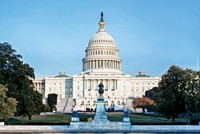Advertisement
Grab your lab coat. Let's get started
Welcome!
Welcome!
Create an account below to get 6 C&EN articles per month, receive newsletters and more - all free.
It seems this is your first time logging in online. Please enter the following information to continue.
As an ACS member you automatically get access to this site. All we need is few more details to create your reading experience.
Not you? Sign in with a different account.
Not you? Sign in with a different account.
ERROR 1
ERROR 1
ERROR 2
ERROR 2
ERROR 2
ERROR 2
ERROR 2
Password and Confirm password must match.
If you have an ACS member number, please enter it here so we can link this account to your membership. (optional)
ERROR 2
ACS values your privacy. By submitting your information, you are gaining access to C&EN and subscribing to our weekly newsletter. We use the information you provide to make your reading experience better, and we will never sell your data to third party members.
Policy
Congressional Outlook For 2012
Election year, partisan politics likely to leave little room for action on key chemical-related issues
January 24, 2012
| A version of this story appeared in
Volume 90, Issue 4

The inability of the Republican-controlled House of Representatives and Democrat-controlled Senate to find common ground will continue to plague the second session of the 112th Congress, as partisan fighting shows no sign of decreasing. As a result, important chemical-related issues, such as curbing greenhouse gas emissions, modernizing the Toxic Substances Control Act, and reforming chemical plant security regulations, will face an uphill battle.
Another confounding factor is that this is an election year, which means Congress is likely to spend much of its time grandstanding. Members will want to spend as much time on the campaign trail as possible, as opposed to staying on Capitol Hill and working through legislation.
Any bills that do pass are likely to be cast in terms of jobs. Members of both the House and the Senate have already spun much of the legislation introduced in the first session of this Congress in terms of creating jobs if they support it, or killing jobs if they oppose it.
For example, over the past year, the House has passed some 27 bills that Republican leaders identified as key “jobs bills.” The measures received little support from Democrats, who classified them as antienvironmental and a threat to health and safety. The legislation, none of which has cleared the Senate, would have, among other things, eliminated air pollution regulations for coal-fired power plants and cement manufacturers, sped drilling off Alaska’s coast, and ended the Environmental Protection Agency’s authority to regulate greenhouse gases.
This is the situation in which several key science and technology issues will be competing for attention. On top of pushes to make permanent the R&D tax credit for businesses and set up various user fees at the Food & Drug Administration, Congress will also be working through what promises to be a very tight 2012 federal budget. The budget will impact all aspects of science and technology.
The following is C&EN’s annual outlook of what to expect from Congress in the year ahead.



Join the conversation
Contact the reporter
Submit a Letter to the Editor for publication
Engage with us on Twitter